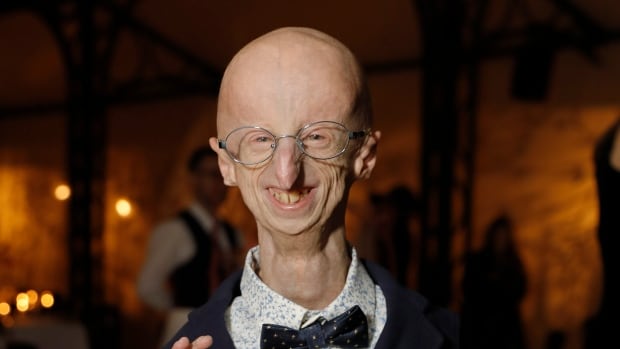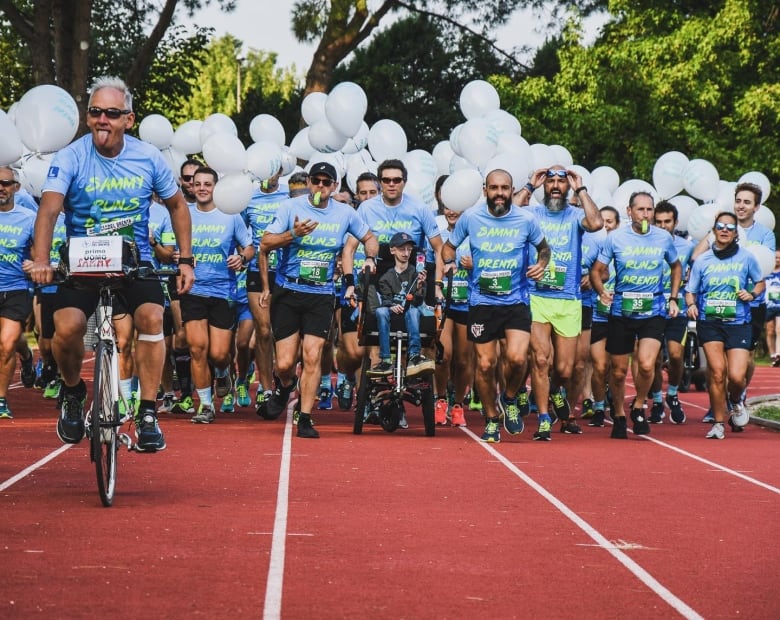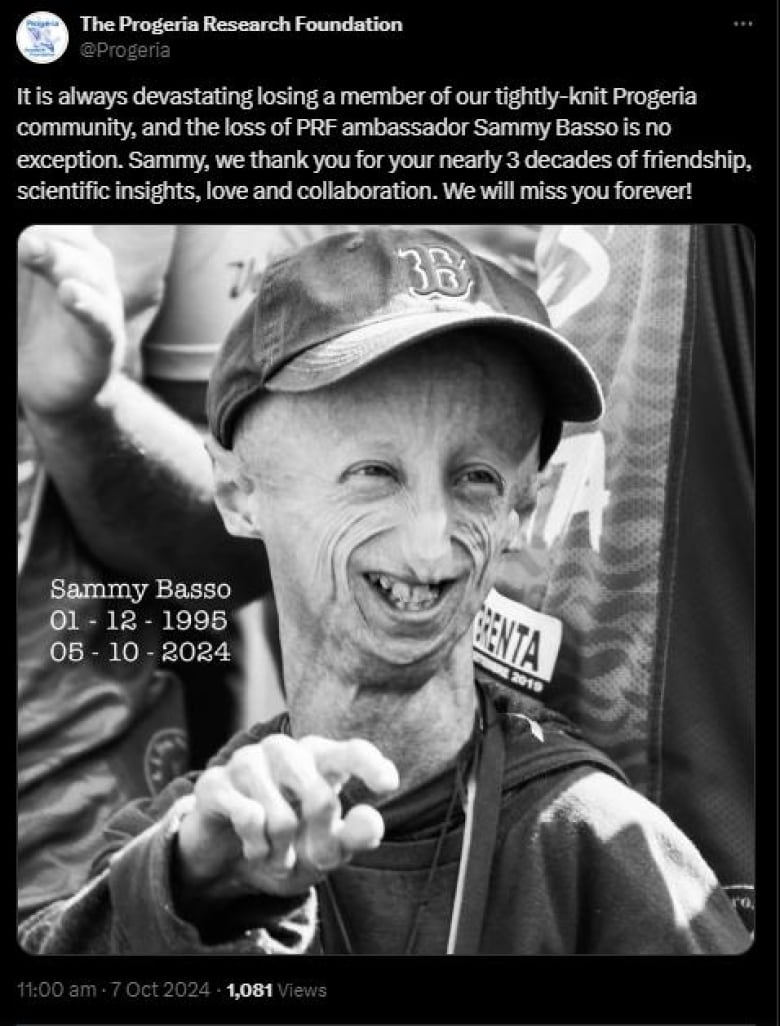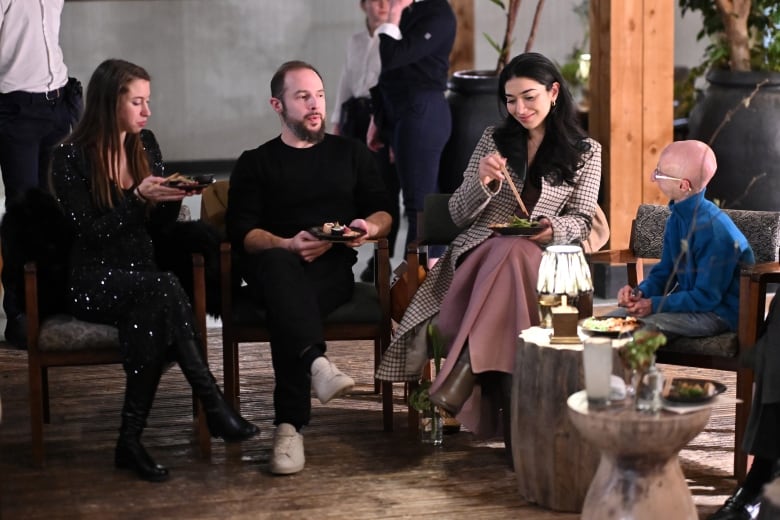
As It Happens6:30Sammy Basso, longest survivor of rapid aging disease, dies at 28
Sammy Basso lived longer than anyone else with his disease, but his death at the age 28 still came as a shock to those who knew and loved him.
“We all knew that Sammy had a terrible circumstance that was not going to allow him to live a full life. But he was so vibrant. He was so alive. He was so engaged,” Dr. Francis Collins, Basso’s friend and colleague, told As It Happens host Nil Köksal. “I was stunned.”
Basso, a molecular biologist from Italy, died on Oct. 5. He was the longest known survivor of progeria, a rare genetic disease that causes rapid aging. Many people who have it don’t make it past their teens.
He dedicated his life to studying and raising awareness about progeria in the hopes that future generations would not have to go through what he did.
Those who knew him say he was not only committed to the cause, but also funny and kind, a brilliant conversationalist, the life of a party, and someone who extolled the kind of joie-de-vivre that comes from knowing all too well that every second counts.
“I like my life as it is, because it’s my life. I have my friends, my parents, my family. These are the most important things,” he said in a 2016 interview with the Catholic publication Aleteia.
“Progeria is a small part of my life, because it only affects the body.”
‘Today our light, our guide, has gone out’
Born in 1995 in Schio, in the northern Italian region of Veneto, Basso was diagnosed with progeria at the age of two.
His friends say he packed more life into his 28 years than most people every do. He travelled the world, hobnobbing with celebrities and politicians, and even once meeting the Pope.
In 2005, when he was 10, he and his parents founded the Italian Progeria Association, a charity that supports research into progeria and supports families dealing with the disease.
“Today our light, our guide, has gone out. Thank you Sammy for making us part of this wonderful life,” the association wrote on its Instagram page.

Nicola Berti met Basso about five years ago at a party, when Basso asked him to run a half-marathon for Sammy’s Runners, a run club that raises money for his charity.
“I accepted, and from that moment, we became friends,” Berti said.
Berti says he saw Basso almost every weekend, sometimes organising charity fundraisers, but often just hanging out. Basso, he says, quickly became the heart and soul of their group of friends.
“He was like glue,” Berti said. “When Sammy sent us a message in our WhatsApp group saying, ‘OK, tonight I can join you,’ it was always like a party. It was always better. You could feel that Sammy was there, because he was like a magnet.”

Basso could talk to anyone about anything, Berti says, and had a knack for making people comfortable enough to open up about their feelings. Whenever there was a conflict in the friend group, he would step in and make peace.
He also had a way of inspiring people to do things they never imagined they could do. Berti remembers running his first marathon two years ago in Venice with Basso by his side.
“It was one of the most beautiful things I’ve ever [done]. And I’m not talking about finishing a marathon, but the joy of sharing this event at the last kilometre, when we were all tired and we were literally suffering,” he said, choking up.
“But seeing this beautiful soul in his cart, smiling and encouraging us to keep going on, it was something that I cannot describe.”
Renowned for his sense of humour
Progeria, also known as Hutchinson-Gilford syndrome, is caused by a single gene mutation. There are only 130 recognized cases worldwide, of which four are in Italy.
It can cause a wide array of health issues, including pain, stunted growth, cardiovascular disease and joint problems, as well as a distinctive appearance that usually includes baldness, a large head, a pointed nose, and a lack of fat beneath the skin.
“He was one of those people who knew he looked unusual, and made that into something that he and everybody else could actually smile about instead of feeling uncomfortable,” Collins said.

The most famous example, he says, is when Basso was travelling along Route 66 from Chicago to Los Angeles in 2014, raising awareness about progeria and documenting his travels for his memoir, Il viaggio di Sammy (Sammy’s Journey), and a National Geographic documentary of the same name.
“They stopped in Area 51, which is where there are these rumours, you know, about aliens have landed, and Sammy put on this remarkably alien looking pair of sunglasses and sat outside,” Collins said with a chuckle. “And that, I’m sure, shook some tourists up.”
Basso was renowned for his sense of humour, his friends say.
Berti and his friends have been collecting testimonies from Basso’s loved ones to put in a book, and he says “the first thing that everyone can remember about him were his jokes, his smile and his love.”
“If I close my eyes and I try to remember him, I can see him laughing, smiling, because he was like that,” he said.
Researching his own disease
Basso worked on a research team alongside Collins, a renowned geneticist, with a mission to develop a gene-editing therapy to treat progeria.
The average life expectancy for people with progeria is 15, according to the Mayo Clinic, and 13.5 without treatment, according to the Italian Progeria Association.
One of the reasons Basso lived as long as he did, Collins says, is that he volunteered for the clinical trial of what would become the first approved drug for the disease.
“There are a few other progeria individuals now living into their 20s. That never used to happen before. But it’s not good enough. We want something even better than that. And that’s what he was helping us work on,” Collins said.
He contributed so much and always in the most selfless, optimistic, fun-loving way.– Dr. Francis Collins
Basso, he says, “put himself into it, heart and soul.”
“He set the agenda oftentimes. He was the guy who hounded everybody about action items,” he said.
He did this, Collins said, despite knowing that whatever progress they made, it likely wouldn’t save his own life. Science is slow, and his disease had already progressed so far.
Collins says they’ve had promising results with gene editing on mice with progeria in a lab setting.
“But that’s a mouse. People are not the same,” he said. “Working with Sammy and the rest of our small team, we were aiming towards — and we will continue to aim towards — a human clinical trial of that approach in the next couple of years.”
Collins was in Nigeria for a genomics conference, driving from Lagos to Ede, when he got the news that Basso had died. He’d been exchanging friendly emails with him just the day before.
“I confess I cried pretty hard. The other people in the car wondered what was going on,” he said.
“I loved this young man. He was such a special guy. He contributed so much and always in the most selfless, optimistic, fun-loving way. There’s nobody like him.”